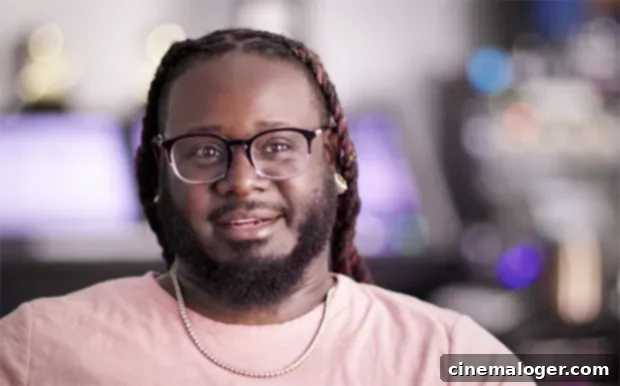T-Pain’s Revelation: Usher’s Auto-Tune Criticism Triggered Four Years of Depression
In a candid and deeply personal revelation featured in the Netflix docuseries This Is Pop, acclaimed artist T-Pain, born Faheem Rashad Najm, opened up about a pivotal moment that sent him spiraling into a profound four-year battle with depression. The incident stemmed from an unexpected encounter with fellow music icon Usher on a flight to the 2013 BET Awards. T-Pain, known globally for his pioneering use of Auto-Tune, described how Usher’s direct and cutting remarks about his vocal effect choices left him questioning his entire career and artistic integrity. This revealing account sheds light on the often-overlooked mental health struggles faced by artists, even those at the pinnacle of success.
The unsettling exchange unfolded while T-Pain, then 35, was traveling in first-class. A flight attendant roused him, informing him that Usher, 42, wished to speak with him. This request, coming from a respected peer whom T-Pain considered a friend, initially suggested a cordial conversation. T-Pain, whose real name is Faheem Najm, had long admired Usher, making the impending conversation seem like a friendly industry chat. However, the tone of their exchange quickly shifted, taking an entirely unforeseen and devastating turn that would resonate with T-Pain for years to come. The unexpected severity of Usher’s words highlighted the stark contrast between public perception and the deeply personal impact of industry criticism on an artist’s psyche.
Recalling the conversation with a vivid memory, T-Pain recounted Usher’s blunt opening. Usher began, “Man, I want to tell you something, man. You kind of… you kind of f**ked up music.” The gravity of this statement, delivered by a figure as influential and respected as Usher, immediately disoriented T-Pain. He confessed to not “understand[ing]” what was happening, especially from someone he considered a friend and colleague. This initial shock quickly morphed into deep introspection, forcing T-Pain to confront the long-standing criticisms he had faced regarding his signature vocal style. The exchange was not just a casual comment; it was a direct accusation that challenged the very foundation of his musical identity and success, implying a catastrophic impact on the industry he loved.

Usher, rather than softening his stance, reiterated and amplified his critique. “Nah, man, you really f**ked up music for real singers,” T-Pain remembered him saying. This specific phrase struck T-Pain with particular force, cementing the moment as an indelible memory. The implication that his groundbreaking use of Auto-Tune had somehow diminished the authenticity and value of “real” vocal talent was a devastating blow. He openly admitted that he didn’t fully grasp the long-term repercussions of this encounter for quite some time, but he unequivocally states that it definitively marked the beginning of his four-year descent into a severe depressive state. The words carried a profound weight, suggesting that T-Pain’s innovative approach, which had brought him immense commercial success and a unique sound, was actually detrimental to the art form itself, devaluing the craft of traditionally trained vocalists and challenging the very core of his contribution to music.
The immense weight of Usher’s words made T-Pain profoundly question his identity and value as an artist. He found himself unable to listen to his own music, constantly plagued by overwhelming self-doubt. “Did I f**k this up? Did I f**k up music?” he repeatedly asked himself, the internal monologue becoming an incessant torment. This internal struggle was compounded by the fact that he felt unfairly targeted for popularizing a tool he didn’t even invent. As he pointed out, “I came out and I used Auto-Tune, but I wasn’t the person who created it. That was Dr. Andy,” referring to Dr. Andy Hildebrand, the inventor of the digital audio processor. T-Pain’s adoption of Auto-Tune was a conscious creative choice, a stylistic innovation that helped define a subgenre and usher in a new era of music, rather than an attempt to undermine traditional singing. His intention was always to create and innovate, not to diminish.

Before T-Pain, Auto-Tune was primarily used for subtle pitch correction, a technical tool to fine-tune vocals, often imperceptibly. However, T-Pain revolutionized its application, transforming it into an instrument in its own right, pushing its capabilities to create a distinctive, robotic, yet undeniably melodious sound that became instantly recognizable and immensely popular. This truly innovative approach propelled him to superstardom with an array of massive hits, including “Buy U A Drank (Shawty Snappin’)”, “I’m Sprung,” “Bartender,” and “Blame It.” His unique vocal delivery and infectious hooks not only dominated the charts but also influenced countless artists across hip-hop, R&B, and pop genres. Despite the persistent criticism from some quarters, his commercial success was undeniable, marked by two prestigious Grammy Awards and thirteen nominations throughout his illustrious career, solidifying his place as a true innovator and a significant force in contemporary music. His impact reshaped vocal production, making his sound ubiquitous and inspiring a generation of artists.
The backlash T-Pain faced was not confined to private conversations with fellow artists; it was a relentless onslaught of public scrutiny and often hateful comments for his signature sound. For years, he endured harsh judgment from critics, other musicians, and the public, who often dismissed his artistry as a mere technological gimmick. In a candid 2014 interview with The New Yorker, he eloquently articulated the profound emotional toll of such criticism: “People can act like, you know, ‘I don’t care about when people hate on me,’ but the second that they do, you feel that! Like, that’s really somebody saying that sh*t about you—it’s not, like, an artificially generated comment that these people are leaving on these YouTube videos.… When people say I suck and I should kill myself, I don’t really feel good about that!” These raw sentiments reveal the deep wounds inflicted by public contempt, which often dismissed his artistic contributions as mere technological trickery, ignoring the creative ingenuity behind his sound. The dehumanizing nature of online comments, particularly those encouraging self-harm, underscores the severe psychological impact of fame and public scrutiny.
T-Pain’s experience sheds crucial light on a broader and increasingly important issue within the entertainment industry: the mental health struggles faced by artists under constant public and peer scrutiny. The immense pressure to constantly innovate, maintain relevance, and withstand the often-harsh judgment from critics and fans alike can have devastating effects on an individual’s well-being. His story highlights how even highly successful artists, celebrated for their unique contributions and commercial appeal, are not immune to the psychological impact of negative feedback, especially when it originates from esteemed colleagues or figures of authority within their field. For T-Pain, Usher’s words carried an immense weight precisely because they came from someone he respected and admired, turning what might have been intended as a professional critique into a deeply personal attack on his self-worth and artistic legitimacy. This incident serves as a poignant reminder that words, particularly from influential voices, can have long-lasting and profound consequences on mental health.
Years after the fateful conversation that initiated T-Pain’s painful journey, Usher publicly acknowledged and apologized for his hurtful remarks. In 2020, during an episode of the web series Behind the Music, Usher stated with sincere regret, “I’m going to take this opportunity to say to you, my brother, I’m sorry. I apologize for that. I didn’t mean to be hurtful.” T-Pain, demonstrating remarkable grace and understanding, confirmed he accepted the apology, recognizing Usher’s sincerity and growth. While this eventual reconciliation brought some measure of closure, it doesn’t erase the years of emotional distress and self-doubt T-Pain endured. His openness in This Is Pop serves as a powerful reminder of how a single, seemingly brief conversation can profoundly alter an artist’s trajectory, impacting their mental well-being, creative output, and public perception for years to come. It also emphasizes the importance of empathy and accountability in professional relationships.
Despite the initial pain and the subsequent arduous battle with depression, T-Pain has emerged as an incredibly resilient and enduring figure in the music industry. He continues to be a vocal advocate for mental health awareness among artists, using his platform to destigmatize these crucial conversations. Furthermore, he has unequivocally demonstrated his exceptional vocal talent beyond Auto-Tune, most notably through his triumphant and widely acclaimed victorious run on The Masked Singer. On the show, he showcased his natural voice with breathtaking skill, silencing many doubters and proving that his artistry transcended any single technological tool. His remarkable journey from an innovative pioneer to a celebrated vocal talent, all while grappling with the emotional scars of industry criticism, underscores his enduring impact, artistic integrity, and unwavering dedication to his craft. T-Pain’s story is a compelling narrative of innovation, criticism, mental health struggles, and eventual triumph, offering invaluable insights into the complex and often challenging relationship between technology, artistry, and personal well-being in the ever-evolving music landscape.
